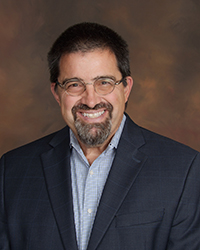A Hands-Off Approach
As the casino industry considers expanding cashless gaming options amid the pandemic, Boyd’s Gaming Law students offer a regulatory helping hand

By Patrick Everson
Long before anyone heard about COVID-19, let alone realized its devastating impacts, the need to embrace a cashless economy was already quite clear in various business sectors. Nevada’s anchor industry, casino gaming, certainly understood the value of and demand for such transaction options, but gaming regulations—rightly strenuous, but arguably behind the times—hindered that transition.
“There was always a gradual transformation on the casino floor to contactless forms of transactions—the demise of tokens, the increase in different types of ways to fund accounts,” says Anthony Cabot, who leads the Gaming Law Program at the UNLV William S. Boyd School of Law. “It’s been a really slow process. But COVID-19 brought to light that there are already many patrons who have moved to cashless with [retail] purchases, such as their daily coffee. COVID just accelerated the trend.
“Unfortunately, the gaming industry is still significantly behind retail industries that don’t have the regulatory restrictions that a casino has, both at the state and federal level.”
Sensing a need for the state to clear those regulatory hurdles—and quickly—Cabot enlisted the help of his gaming law students. For the past several months, those students have tried to turn very sour COVID lemons into cashless gaming lemonade via policy reform that would bring the gaming industry into the 21st century.
“A lot of the research that has gone into the best practices for regulatory reform has come out of directed research some of our students did over the summer,” Cabot says. “[The pandemic] has allowed the Boyd Law School to take a look at these cutting-edge issues and provide insight and guidance from a policy perspective.”
For several years, cashless gaming had been explored through two primary lenses: convenience (for the customer) and efficiency (for the casino). That partially explains why momentum for cashless gaming was slow to build—it wasn’t considered a necessity for industry survival.
That all changed, however, when the pandemic penetrated Nevada’s borders in March. Almost immediately, gaming law students began observing casinos’ methods for dealing with COVID, both short and long term. The key question to address: What about the fact that the casino customer has to touch everything?
“From cash machines to chips at the table, so much interaction involves constant touching. You start to look at all those different touchpoints and ask: How do we reduce that?” Cabot says. “All those things have to be reimagined.”
While Cabot explored cashless options in Nevada casinos in a report he hopes to publish soon, his students went to work on regulatory changes to achieve a more touch-free casino floor—changes such as a greater allowance of credit cards and services such as PayPal for use in gaming, along with smartphone e-wallets.
“The industry has to adjust to the spending habits of its patrons, not expect the patrons to adjust to the payment methods of the industry,” Cabot says. “At the same time, to ensure customer acceptance of the casino experience again, there has to be the perception that casinos are operating with the utmost caution.”
That’s why the regulatory policy work being done by gaming law students is so vital. For gaming to introduce more cashless gaming options, it first must ensure that those options pass legal muster. Only then can the industry—whose long-term survival hinges on its ability to adapt to the “new normal”—make that long-overdue leap into the 21st century.